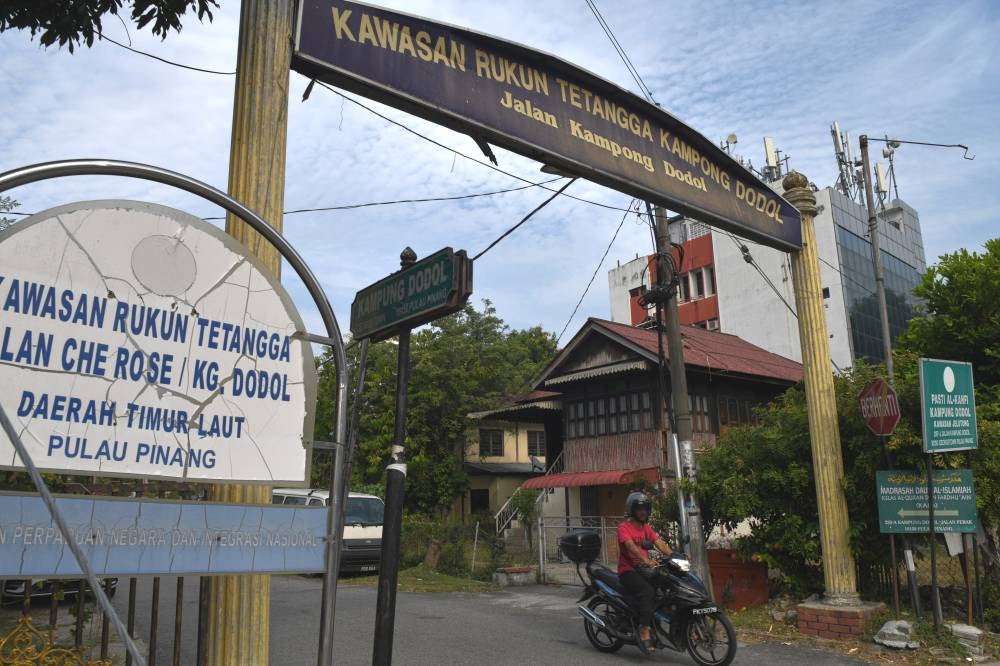A century of unity: The story of Kampung Dodol
Established in 1876, this oldest village in the state, covering approximately 14 hectares and situated on Jalan Perak, is often perceived as a Malay village due to its name and its houses' predominantly Malay architectural style.

GEORGE TOWN - Nestled in the heart of rapidly developing Penang Island, a century-old village, Kampung Dodol, holds stories of deep-rooted unity among its diverse residents.
Established in 1876, this oldest village in the state, covering approximately 14 hectares and situated on Jalan Perak, is often perceived as a Malay village due to its name and its houses' predominantly Malay architectural style.
However, according to the residents who have inherited the settlement from previous generations, the name ‘Dodol’ was given because of the presence of Indian Muslims (mamaks) selling dodol on a small scale there, indicating that the village is not solely occupied by Malays.
In fact, this heritage village is also a testament to the harmony enjoyed among various ethnic groups, as it is home to not only Malays but also Chinese residents, as well as a small number of Indians and Sikhs, with no barriers separating them.
Described as family, the children of Ah Leng, Salmah and Gopal are treated like one's own, with no distinctions made, as recounted by Md Noor Din, 68, a native of Kampung Dodol.
Indeed, this man vividly recalls how the Chinese villagers at that time, only around five families who ran grocery stores, were very helpful to the Malays in the village, providing them with daily necessities at affordable prices despite the distance from the town.
"The Chinese community has been living here (Kampung Dodol) since the time of our grandparents and has mixed with the Malays ever since. Next door to my house, there was a Chinese shop run by Ah Kaw and later passed down to his son Ah Wee. We are like siblings, caring for one another, united and never in conflict.
"Our closeness is such that we could come and go freely from each other's homes, and they speak like Malays. They learned religion and the Quran from my late mother-in-law, Aminah Yassin, who taught people to read the Quran at that time," he told Bernama.
The joy of unity is also evident during festival seasons when they celebrate together as one family, sharing various traditional dishes. In the evenings, they enjoy fireworks generously without thinking about who bought them.
Similarly, during any festivities in Kampung Dodol, the entire village comes alive with joy. It can be said that the Chinese and Indian residents' wardrobes surely include traditional Malay attire, such as the baju Melayu or baju kurung, neatly kept for any celebrations.
However, according to Md Noor, all that remains are fond memories he will cherish for the rest of his life, as the atmosphere is no longer the same as before due to many of the subsequent generations moving away after marriage.
This has led to the concerns of another original resident of Kampung Dodol, Haminah Hassan, 82, about whether this historically rich heritage village will eventually disappear, especially with the rapid development surrounding it.
Nevertheless, Datuk Abdul Kader Md Ali, president of the Penang Malay History and Civilisation Association, believes that the spirit of unity remains strong among the residents, even though the atmosphere is not as vibrant anymore and the Chinese community has dwindled to only a small fraction.
"Besides the grocery stores, there is also land leased by the Chinese at the edge of the village where they grow vegetables, saving villagers from the hassle of buying vegetables from the market.
"There are also Indians and Sikhs selling cloth, and we’ve never had any issues. Even their children mix with the Malays,” said Abdul Kader, also an original resident of Kampung Dodol.
Currently, there are nine original landowners in Kampung Dodol, with some having been endowed as wakaf (charitable endowments) such as Tanah Wakaf Wan Chik Ariffin, Tanah Wakaf Hashim Yahaya and Tanah Wakaf Kapitan Keling.
"According to records, Kampung Dodol is one of only 22 villages still existing in Penang out of the original 250 villages on the island, with the rest having been obliterated by development,” he said.
While Kampung Dodol may not have much material value, its richness lies in its heritage, which should be preserved for future generations. Efforts in this direction are identified as having strong prospects for long-term tourism. - BERNAMA









